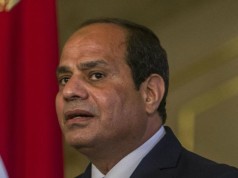
Remarks of Arab Media Freedom Monitor “Ikshef” on Egypt’s Unified Media Bill
- The bill abandons constitutional gains and ignored the issue of imprisonment in publication offenses.
- It is biased for the elders, and threatens journalism with national security.
- It places restrictions on the freedom of issuing newspapers and restricts the right of individuals to own newspapers
- It increases government domination and kills e-journalism
Prepared by: Ikshef’s Studies Unit
The Egyptian cabinet announced on Monday, May 16, 2016 approval of the Unified Media bill, and referred it to the Legislation Department of the State Council in preparation for submitting it to the parliament, a bill that has already been prepared by an ad hoc committee at the Egyptian Journalists’ Syndicate “EJS” as announced by EJS’s general secretary, and this means that the Egyptian government has ignored another bill prepared by a number of press and media figures commissioned by the cabinet itself. Some see that as a kind of appeasing EJS after the crisis of storming its headquarters by the police in early May 2016. Others see the move as an attempt to circumvent the fury of journalists and discharge it in a broad debate about the provisions of the bill, and creating a rift between journalists and those working in media, and a rift between those and the other administrative workers because of some discriminatory provisions.
The hostile climate against freedom of press at the present time would not allow issuing a legislation supportive for freedom of the press and media. It is more likely that the government will pass its ongoing battle with the press to parliament with its formation that is also hostile to media freedoms, this was apparent in the hostile spirit recently in the crisis of storming EJS headquarters.
It is expected that some MPs, whether on their own or directed by government agencies submit Media bills competing the bill announced by the government. In this case, according to the norms established, all bills will be referred, including the government’s, to the legislative committee or a joint committee of both legislative and media committees, or even the national security committee to prepare a bill out of those bills to be presented to the parliament.
As a result, the limited gains included in the current bill would shrink to the minimum, or even we may find more to undo the constitutional gains guaranteed by the Constitution of 2012 and amendments in 2014.
With the announcement of this bill, we state the following general remarks:
- The bill is a setback from the constitutional gains made by the Egyptian press in the constitution of the year 2012, which were broadened in the constitution of 2014. This bill violates the Egyptian constitution in spirit and in many of its provisions. The spirit of the Egyptian constitution reflects an open-minded mentality after the revolution of January 25, 2011. This mentality came up with texts that are guarantor of freedom of the press and media in the constitution, freedom of issuing newspapers by natural and legal personnel by notification only (Article 70); prohibition to stop or shut down newspapers and media outlets; inadmissibility of imprisonment in publication cases (Article 71); free flow of information and accountability towards those who block it or cheat them (Article 68 ), the inviolability of postal, telegraphic, e-mail, telephone calls and other means of communication; and the inadmissibility of disabling or stopping means of public communication (Article 57). Also, the constitution put an end to the control of the executive and legislative authorities on media, which were represented by the Ministry of Information and the Shura Council to be replaced by national councils that are supposed to be more reflective of public opinion (Articles 211 and 212).
With these liberal constitutional texts, which are supposed to result in free press that competes with the greatest of democracies, however, the new bill puts restrictions on constitution provisions and sometimes imposes tutelage reflecting a restrictive mentality that journalists’ community have for long time complained about. Freedom to publish newspapers for natural people become almost non-existent in the bill as it restricts this right to setting up joint-stock companies, meaning that it deprives natural persons of owning or issuing newspapers. Also, the bill grants the executive authority the right to prevent some publications under the pretext of harming national security and does not not let it to judiciary. The bill ignores stating prevention of confinement in publishing cases; and it ignores stating punishment of those who refrain from providing information or manipulating them despite the fact that the constitutional text requested so. The bill re-entrenches state control over media outlets through the new bodies by the undemocratic way they are formed which gives the upper hand to the presidency.
- The bill ignores the most important issue currently concerns journalists which is banning imprisonment for publishing offenses. It states only banning jailing on remand in those crimes which means that it has not added a new, as remand in publication cases is prohibited according to Article 41 of Law 96 of year 1996; what remained of this were the charges of insulting the head of state, which were abolished by a decree issued by former President Mohamed Morsi in 2012.
- The bill emphasizes the duality of national press on the one hand and the private and partisan press on the other hand, a duality that no longer exists except in underdeveloped countries. However, objectivity requires referring this error to the Constitution, which includes this duality, and the bill came to entrench and detail it, while it was possible to reduce the differences between them concerning method of management and accountability, and the rights and privileges of journalists.
- The bill promotes the discrimination between journalists and media workers on the one hand and the workers and executive officers in the national press and media institutions on the other hand, which is violating the constitution, as well as discrimination between journalists and media professionals in these national institutions and their counterparts in the private and partisan institutions, particularly in the social and health care.
- The bill is more biased for the elders. It concentrates more on the element of age rather than qualifications, as it requires years of work up to 20 years within an institution to assume leading positions in it. The bill also raises pension age for journalists and media workers to 65 years, which entrenches an aging status in major journalistic institutions that would freeze the process of promotion to the high positions to long terms, as the elderly would remain in their leading jobs till they reach 65 years with the exception of the posts of editor-in-chief and chairman of the board.
- The bill states national security as a limit to freedom of the press in many provisions, without specifying the concept of national security.
- The bill aims at dominating and controlling online media, which is a haven for those seeking greater freedom spaces during the past period, which were not costing the young people a lot of money to create their online media projects, while the bill specifies the capital of a website project to be half a million pounds (about $ 50000), an amount that cannot be provided by young people who are attracted to online media projects.
- The bill consolidates state control of media, rather than terminating it by newly established national councils and bodies, which are supposed to replace the Ministry of Information and the Shura Council in managing national press and media institutions.
- The bill gives a major role for EJS and media workers Syndicate, while ignoring other unions and organizations concerned with the press and media.
- The bill came with non-scientific definitions of a journalist and a media worker, as it defined them as members of EJS or media workers syndicate only. Also, it is a that excludes thousands of journalists and media workers who are not enrolled in unions and deprives them of legal protection and puts them under penalty of law on charges of impersonation. The bill also includes non-scientific definitions of a newspaper, a press institution, and a media outlet. This needs to be scientifically specified.
- The bill is more accurate concerning a journalist or media worker acceptance of gifts, and bring ads (Article 25-27), as it fills the gaps of previous legislations, and specifies disciplinary punishment on that, with obliging the journalists or the media worker to submit those gifts, or ads’ commissions to his/her institution.




